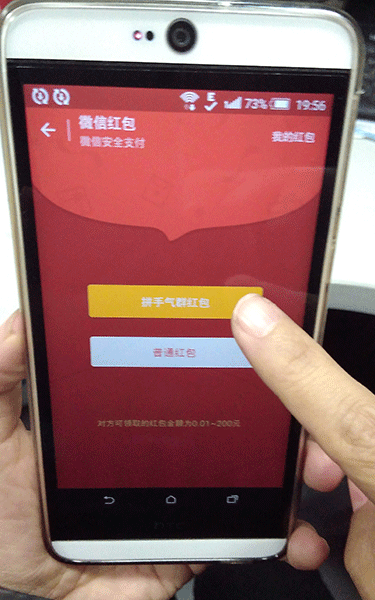 |
|
A cellphone user sends hongbao, or lucky money, using a WeChat account.[Photo by Yan Xiaoqing/China Daily] |
Government officials must be alert for WeChat bribes, however small they may be, expert warns
"Red envelope" gifts via mobile devices, popular in China during festivals, have brought a new challenge in the fight against corruption.
Cheng Wenhao, director of the Anti-Corruption and Governance Research Center at Tsinghua University, said that passing money on the instant messaging tool WeChat "may be a disguised gift to someone close to officials who can help solve a problem for them".
The gift, often called hongbao or "lucky money", is a person-to-person transaction and seen as fun, "but it may become a breeding ground of corruption if we don't pay attention", Cheng said.
Before Mid-Autumn Festival and National Day, discipline inspectors in Fujian and Liaoning provinces issued a notice to government officials clarifying the ban on receiving "lucky money", according to jcrb.com, a website managed by China's top procuratorate.
Stricter inspections targeting bribery in cyberspace was also developed in Gansu province, in a move to implement the "eight-point rules" that were put forward by the central leadership to restrict bureaucracy, reduce red tape and formalities and ban the lavish use of public funds, the website said.
Cheng added: "Although the amount of a transaction on WeChat is not big, 200 yuan ($31) each at most, it is not a small number when it is accumulated.
"The small amount of every transaction sometimes also makes government officials let their guard down," Cheng said.
Under the current Criminal Law, anyone offering more than 10,000 yuan ($1,550) in bribes faces at least a five-year prison sentence.
The invisibility of WeChat "lucky money" makes it difficult for disciplinary inspectors to trace, Cheng said.
He suggested that inspectors should inspect every industry and keep their knowledge in technological fields up-to-date.
Fan Hongmin, deputy president of the School of Public Management at Zhengzhou University in Henan province, praised the disciplinary inspection authorities' practice of forbidding government officials from receiving WeChat lucky money and electronic gifts.
"The practice reflects that our anti-corruption work is catching up with the times and has no dark corners," Fan said.
A spokesman for WeChat provider Tencent, who declined to be named, said that offering such bribes is absurd because the transactions can be tracked.
He added that so far he has not heard of any instance of bribery on WeChat.
Cheng, however, said that it is difficult to trace transactions because there are so many "red envelopes" every day, so it is necessary for government officers to be alert.
He said it is obligatory for discipline inspectors to order officials to link their WeChat accounts with their real-name bank cards, which should make future investigations easier.
